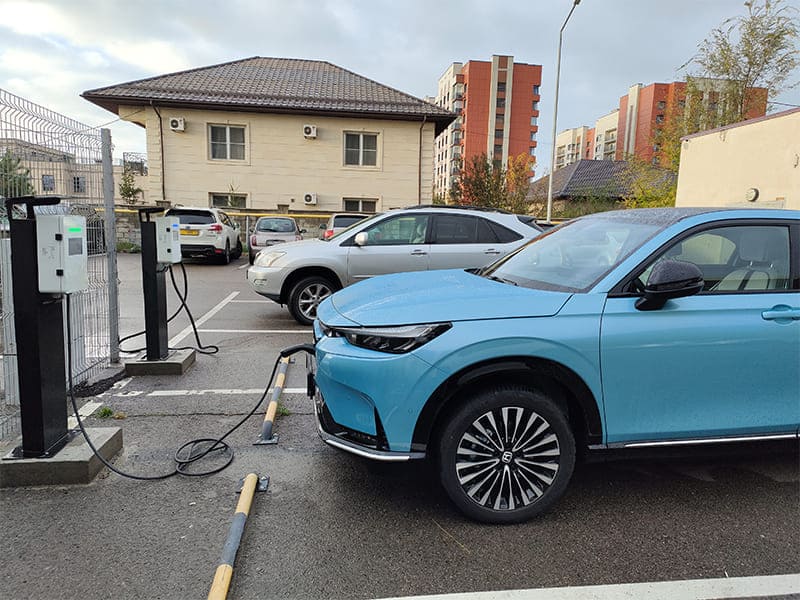What’s the difference between 16A and 32A EV charging station? Electric vehicle ownership is growing rapidly. Consequently, understanding charging options is crucial. Many homeowners compare 16A and 32A stations. This article explains their key differences clearly. We will explore power, speed, and installation requirements.
Choosing the right amperage affects your daily routine. It impacts charging time and electrical system costs. Therefore, this decision is very important for EV owners. Let’s examine these two common options.
Understanding Amperage: The Basics
Amperage, or current, is like water flow in a hose. A higher amperage means more electrical current flows. Consequently, a 32A EV charging station delivers more power. It charges your vehicle significantly faster than a 16A model.
However, speed is not the only consideration. Your home’s electrical capacity is also critical. A 32A EV charging station requires a stronger circuit. This often involves a professional electrical panel upgrade.
Charging Speed: The Most Noticeable Difference
Charging speed is the primary differentiator. A 16A EV charging station typically adds about 15-20 miles per hour. Meanwhile, a 32A EV charger station doubles that rate. It can deliver approximately 30-40 miles of range hourly.
For example, consider a completely empty battery. A 16A unit might need a full overnight charge. Conversely, a 32A EV charging station could finish in just a few hours. This speed advantage is a major convenience.
Installation and Electrical Requirements
Installation complexity varies greatly between them. A 16A station often uses a standard household circuit. However, a 32A EV charger station needs a dedicated 40-amp circuit. This requirement is essential for safety and performance.
Therefore, you must consult a qualified electrician first. They will assess your home’s electrical panel capacity. Upgrading to support a 32A EV charging station may add cost. Nevertheless, it is a worthwhile long-term investment.
Vehicle Compatibility and Onboard Charger
Your car’s onboard charger determines maximum AC charging speed. Most new EVs support 32A or higher AC charging. However, some older or base models might be limited. They may only accept 16A from a station.
Consequently, check your vehicle’s specifications carefully. Investing in a powerful 32A EV charger station is wise. It ensures compatibility with your next EV too. This future-proofing is a smart strategy.
Cost Implications: Equipment and Installation
The equipment cost difference is usually moderate. A 32A EV charging station may cost slightly more. However, the installation cost difference can be larger. The required electrical work is the main factor.
Despite the higher initial outlay, the 32A EV charger station offers better value. Its faster charging improves daily convenience significantly. Therefore, most homeowners prefer this option.
Aegen’s Comprehensive Home Charging Solutions
Manufacturers like Aegen cater to all these needs. Aegen produces high-quality EV charging stations. Their home product line includes various amperage options. This ensures a perfect fit for every customer.
Aegen’s 7kW home charger is a popular 32A EV charging station model. It offers an ideal balance of speed and efficiency. Furthermore, Aegen provides free technical support globally. This service is invaluable for distributors and installers.
The company works with partners worldwide. Their products are used across Europe and South America. Consequently, they understand diverse market requirements. Seek cooperation with EV charging station dealers or installation companies to ensure favorable prices.
Ideal Use Cases for Each Option
A 16A EV charging station suits drivers with short commutes. It is also good for homeowners with limited electrical capacity. Additionally, it works well as a secondary charging point.
A 32A EV charging station is ideal for most families. It easily replenishes a typical daily driving range overnight. Moreover, it provides a safety net for unexpected long trips.
Making the Right Choice for Your Home
In conclusion, your choice depends on your needs. Consider your daily driving distance carefully. Also, evaluate your home’s electrical system capacity. Then, budget for both equipment and installation.
For most new EV owners, a 32A EV charging station is recommended. It offers faster charging and better future-proofing. Therefore, it enhances the overall ownership experience.

